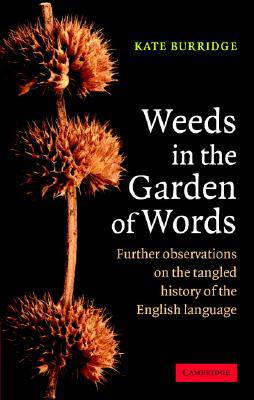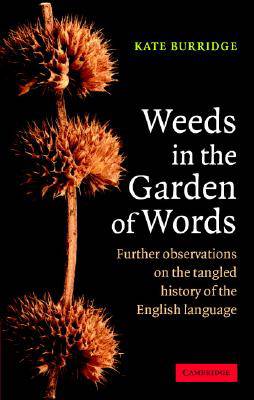
Bedankt voor het vertrouwen het afgelopen jaar! Om jou te bedanken bieden we GRATIS verzending (in België) aan op alles gedurende de hele maand januari.
- Afhalen na 1 uur in een winkel met voorraad
- In januari gratis thuislevering in België
- Ruim aanbod met 7 miljoen producten
Bedankt voor het vertrouwen het afgelopen jaar! Om jou te bedanken bieden we GRATIS verzending (in België) aan op alles gedurende de hele maand januari.
- Afhalen na 1 uur in een winkel met voorraad
- In januari gratis thuislevering in België
- Ruim aanbod met 7 miljoen producten
Zoeken
Weeds in the Garden of Words
Further Observations on the Tangled History of the English Language
Kate Burridge
Hardcover | Engels
€ 135,45
+ 270 punten
Uitvoering
Omschrijving
Kate Burridge follows the international success of Blooming English with another entertaining excursion into the ever-changing nature of the complex and captivating English language. If language is a glorious garden, filled with exotic hybrids as well as traditional heritage specimens, then weeds will also thrive on its fertile grounds. Linguistic weeds may be defined as pronunciations or constructions that are no longer used. For example, Burridge points out how "aint" or double negatives were at one time quite acceptable in everyday speaking and writing but are now classified as "weeds" that should no longer have a place in our vocabulary. And, as she so deftly accomplished in Blooming English, Burridge goes on here to further celebrate our capacity to play with language, and to examine the ways we use it: in slang and jargon, swearing, speaking the unspeakable, or concealing unpleasant or inconvenient facts. In this new volume she gives us another fun and informative work for enjoyable browsing; for discovering intriguing trivia about language, history, and social customs; and for employing as a peerless weapon in word games. Kate Burridge is the Chair of Linguistics at Monash University and a regular presenter of segments on the Australian Broadcast Company.
Specificaties
Betrokkenen
- Auteur(s):
- Uitgeverij:
Inhoud
- Aantal bladzijden:
- 208
- Taal:
- Engels
Eigenschappen
- Productcode (EAN):
- 9780521853132
- Verschijningsdatum:
- 16/06/2005
- Uitvoering:
- Hardcover
- Formaat:
- Genaaid
- Afmetingen:
- 140 mm x 225 mm
- Gewicht:
- 394 g

Alleen bij Standaard Boekhandel
+ 270 punten op je klantenkaart van Standaard Boekhandel
Beoordelingen
We publiceren alleen reviews die voldoen aan de voorwaarden voor reviews. Bekijk onze voorwaarden voor reviews.









